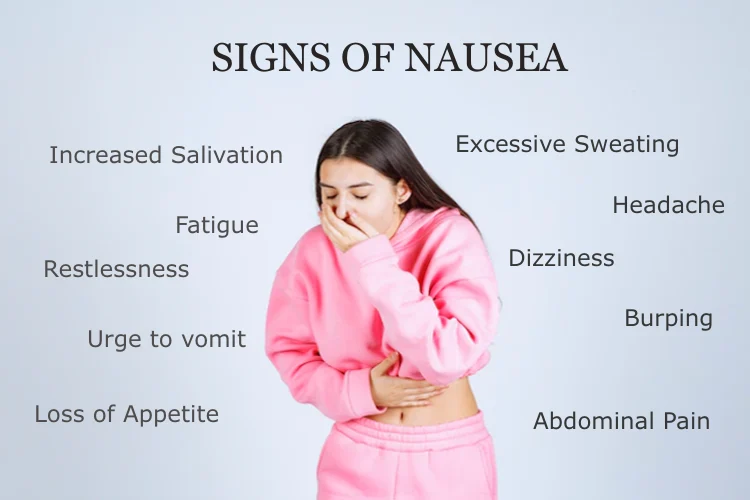When some people feel nervous or anxious, they experience nausea. You might feel slightly queasy, or not feel like eating anything. This kind of nausea can pass over reasonably quickly, or even as soon as the anxiety-provoking situation ends. However, this situation may never end for some (for instance, someone who gets anxious in social situations may find it challenging to stop the anxiety-eliciting situations). In other cases, the situation might end, but the anxiety might not. This continuous anxiety might then lead to severe symptoms of nausea. You may feel sick, or even vomit.
Why can anxiety cause nausea?
Anxiety triggers your stress response (also called the fight-flight-freeze-fawn response) to alert your body to deal with something it perceives as a threat. During this response, the brain releases certain chemicals. Some of these chemicals might enter your digestive tract, where they may lead to an imbalance in the bacteria there. This is what essentially may cause nausea. The brain and the gut are connected; the gut is often called the “second brain”.
Along with nausea, there is a possibility of other gastrointestinal issues like abdominal pain, and irregular or uncomfortable bowel movements. The symptoms you feel when you are anxious are very real. Your body is trying to protect you.
How to know if your nausea is due to anxiety
It should be noted that just because you experience anxiety, does not mean that you will also experience nausea. It frequently relies on how worried you are or how intense your anxiety is, but various people react uniquely to anxiety. You shouldn’t be alarmed about nausea until it is prolonged or frequently occurs, because nausea is a sign of stress and goes away when relaxed.
Tracking your nausea may help you see what is causing it. It will help to note what was happening when you experienced nausea, and what you tried to do about it. This exercise may provide insight into any patterns that generally lead to nausea. It might also help you determine whether the nausea you have is due to anxiety or due to other medical reasons.
Anxiety Disorders that may cause nausea
To an extent, some anxiety is normal, and even healthy, to cope with life’s stressors. However, it is essential to know about the different disorders that may be due to feeling excessively anxious. Any of the following disorders can have gastrointestinal effects, including nausea.
– Generalised Anxiety Disorder: This includes an intense worry about all aspects of life, that has lasted for at least six months.
– Social Anxiety: This is an overwhelming worry in the context of social situations. One may feel excessively self-conscious, or perceive others judging their actions.
– Phobias: This is an irrational and intense fear of a specific situation or thing.
– PTSD (Post-Traumatic Stress Disorder): This is an intense anxiety response that is developed due to a traumatic event. There may be vivid memories, flashbacks, dreams, and outbursts along with the anxiety.
– OCD (Obsessive Compulsive Disorder): This form of anxiety involves obsessive thoughts, and compulsive behaviour or rituals in an attempt to get rid of those thoughts.
– Panic Disorder: This disorder involves persistent panic attacks, which are intense, sudden feelings of doom, with pertinent physiological symptoms.
Coping with anxiety
Therapy: It is vital to consult a mental health professional to help you reduce your anxiety and develop healthy coping mechanisms. CBT (Cognitive Behavioural Therapy) and Exposure Therapy are research-backed approaches to dealing with anxiety.
Our trained mental wellness experts at Ganeshaspeaks.com can help you treat your anxiety if it is hampering your life process.
Breathing Exercises: Certain forms of breathing like abdominal breathing and deep breathing can relax your body. Breath work can be practised daily to help with overall anxiety, while specific exercises can help you calm down in moments of high anxiety.
Mindfulness Techniques: These are also a form of stress reduction techniques which include guided imagery, meditation, and progressive muscle relaxation.
Self-Care: One should not forget the basics while combatting anxiety. It is crucial to get enough quality sleep, exercise consistently, take care of their diet, and ensure they are not isolated.
Medications: If the anxiety seems out of control, you could also consult a psychiatrist, who can prescribe anti-anxiety medications. Do not do this without consulting a professional.
Coping with nausea
There are some things you can do to deal with nausea:
– Avoid any caffeine. Try sipping an ice-cold drink, slowly.
– Eat something plain and dry, like bread or plain biscuits.
– Change into something that allows you to breathe if you are wearing tight clothes.
– Avoid fried, sweet and greasy foods
– Sniff a slice of lemon or suck on a mint
– Avoid sudden movements. Lie down or sit in a comfortable position.
– Many over-the-counter medications can help with nausea. Consult a medical professional for the same.
– Avoid any strong odours.
Don’t just try to treat your symptoms related to anxiety. Treat the root cause. Seek help to deal with your anxieties at Ganeshaspeaks.com.



